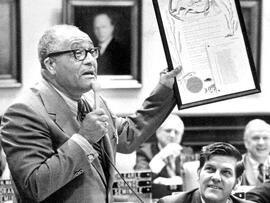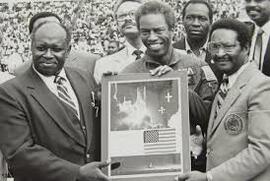Promotional photographs, correspondences, news articles, publications, programs, miscellaneous
This collection consists of personal papers from Florida A&M University’s Arthur L. Kidd. Kidd, a native of Pennsylvania, earned a B.A. degree in 1924 from the University of Michigan, and in 1929, a Masters of Arts degree from Columbia University. Kidd also did additional studying at the University of Iowa, Columbia University, and New York University. He began his teaching career at Tuskegee Institute in 1924 before accepting a position at Florida A&M College (FAMCEE) in 1925 as Principal of the High School. Kidd worked at FAMCEE until 1944. During his nineteen years of service to the college, Kidd worked in numerous positions, including: Head of the Department of History, Acting Director of the Extension Division, Acting Dean for the College of Arts and Sciences and College Registrar. In October 1944, Kidd left his position at FAMCEE to work with the United Nations Relief and Rehabilitation Administration, where he worked in various capacities in Washington, D.C., and abroad in locations including France, Germany, and Holland. He returned to the United States in 1950 and worked for a year at Maryland State College before accepting a second appointment at FAMCEE in 1951 as Director of the Division of Social Studies. Upon the college reaching university status in 1954, in the academic re-organization, Kidd consequently became the Associate Dean of the College of Arts and Sciences. Until 1969, he served FAMU in various capacities, including director of institutional studies and director of university administrative planning.
The material type in this collection were mainly magazines, news articles, and news clippings from 1949-19687 that followed local and national events affecting Negro people and occurrences impacting their lives. The records of this collection are especially important and informative in that they as resources that document firsthand the many historic events that occurred during the American Negro Civil Rights Years. Most of the records document the passing of school integration and public desegregation legislation, mass boycotts, sit-ins, and other forms of protest, as well as the brutal, nationwide social turbulence that accompanied this period. Additionally, a small amount of materials related to Kidd's instructional duties at FAMU are included.
Biographical data and inclusive subjects were acquired from Murell Dawson circa 2002.
The records in the Gilbert Porter Desegregation Files consist of Dade County school reports, and national school reports relating to integration and desegregation plans and procedures. There is also material on the Florida Conference of Social Welfare and the Florida Conference of Social Work. A large portion of the collection is newspaper clippings about race relations and integration in Dade County, and the State of Florida.
Inclusive subjects and descriptions of processing procedures provided by Kenneth D. Harris and M. Dawson circa 1999.
Dr. James L. Hudson was born in 1904 in Birmingham, Alabama. He attended Morehouse College in Atlanta, Georgia. He graduated from the institution in 1926. After graduating, he was ordained as a minister and then enrolled in Colgate-Rochester School of religion, where he camed a divinity degree in 1931. Afterwards, he worked as a chaplain at Leland College in Louisiana until 1946. Later he was carned a doctoral degree from Boston College. Following this, he accepted a position as a chaplain and professor at Florida A&M University (FAMU). At FAMU he created the institution's Department of Religion and Philosophy and served as its first departmental chairperson. In Tallahassee, Hudson was a close friend with another Morehouse graduate, Rev. Charles K. Steele, pastor of the city's Bethel Baptist Church. The two religious leaders worked on numerous civil rights campaigns including the 1956 Tallahassee Bus Boycott.
Hudson was also president of the Tallahassee Ministerial Alliance, a co-founder and active member of the Inter-Civic Council. Even after retiring from FAMU in 1973, Rev. Hudson remained active in civil rights and social justice initiatives. He died in 1980.
This collection is comprised of printed records that document Davis' military career and his various recognitions for rendering service to the United States as a member of the historic Montford Point U.S. Marines. Included in the records are: cassette tapes (inaudible); correspondence; legislative recognitions from the U.S. Congress, State of Florida, and City of Quincy; news articles, photographs of medals, awards, and resolutions; and a copy of Davis' World War 2 service record.
Joseph “Joe” Lang Kershaw, Sr. was the first African American legislator elected to the Florida Legislature since Reconstruction. Born on June 27, 1911, in Live Oak, Florida, Kershaw was a 1930s Florida A&M University alumni who saw the beginning of football at the college, pledged Kappa Alpha Psi, and worked as a janitor inside the Florida Legislature. After working as a teacher in what is now known as Miami-Dade County, Kershaw was elected to the State House of Representatives in 1968 and served for 14 years. He also served as chairman of the Elections Committee, where his work led to the formation of the Florida Human Rights Commission. Kershaw died in Miami, Florida, at age 88 on November 7, 1999. The documents in this collection mostly pertain to aspects of his personal and academic life and his role as a legislator in the Florida House of Representatives. It also has documents about his father, A. J. Kershaw, and friends/colleagues like Gwendolyn Cherry and Althea Gibson.
In 1975, James N. Eaton spearheaded the effort that ultimately gave rise to the creation of FAMU’s Black Archives. By 1976, the ‘Black Archives Research Center and Museum’ came into existence, and Eaton was recognized and appointed as its inaugural archivist, curator, and director.
For the next three decades, he helped amass a collection of memorabilia and printed records that now comprise one of the region’s most extensive collections of first-source material relating to the history, culture and contributions of people of African descent living in the United States.
James Eaton constructed in 1976 the first exhibits, using historical memorabilia from his own family. Afterward, he petitioned the university and community members to contribute historical material to the repository. Ilis call was answered by the first Black Archives donors and volunteers, who included: Donald Hill, Frank Pinder, John F. Matheus, and a host of other individuals and groups. Thus, the Research Center was chartered in 1976 and was officially opened in 1977.
Mr. Charles Hamilton was an African-American landowner, farmer, and businessman who lived in Marion County, Florida, during the late 1800s and turn of the twentieth century. Marion county is located in Central Florida. According to information from the 1900 US Census, the Hamilton Family patriarch, listed as Charly Hamilton, was born during slavery in 1853 and
possibly migrated to Florida from South Carolina after the Civil War. Charly and his wife Georgia had three sons, Richard, Charlie, and Jonas, and two daughters, Estelle and Texella. Hamilton and his descendants also owned property and conducted business in neighboring Levy County.
The records in this collection consist of advertisements, books, magazines, newsclippings, newsletters, photographs, programs, and other publications such as theatrical playbills and posters.
Inclusive subjects and description of processing procedures provided by M. Dawson and L. Brown circa 1993.
The majority of records in this collection were hand-written letters from Bishop Sims to his sister Mrs. Miriam Sims-Tooke. The majority of the letters were written by Sims while he was working in South Africa. The collection also contained cards and photographs.
His father, Rev. Felix Rice Sims, was well educated and of high standing in his community, and the son has kept the family traditions. While at Oberlin College, he was noted for his ability as an athlete, playing on both the football and track teams. He was a winner of scholarships for four successive years at Oberlin College. He was elected treasurer of the Divinity Council while at Oberlin. He was elected by his class of several hundred white men and women to deliver the "Mantle and Key" Oration at Commencement on graduating from Oberlin Divinity School.
He was the coach of the Football and Baseball teams at Morris Brown University from 1912-1917 and at Allen University from 1917-1924. He was a Football Official under the auspices of the Rules Committee, of which Walter Camp was President, 1918-24.
President Sims was appointed a special messenger representing the State of South Carolina to attend the National Educational gathering at Topeka, Kansas, by Governor McLeod? (source text unclear), in July 1925.
Inclusive subjects and description of processing procedures provided by E.M.V., S. Y. Wilks, and Murell Vinson circa 1985.

